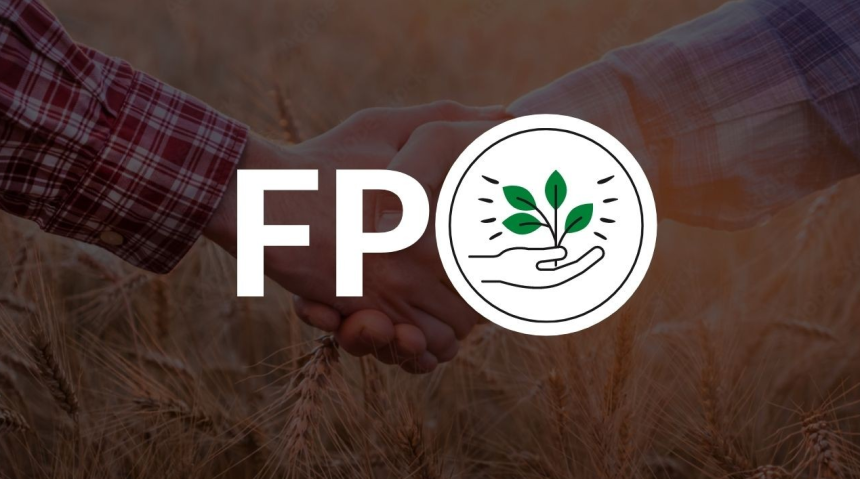Grass root level institutional innovations in the form of farmers’ collectives have received wider popularity all over the world in last two decades. Farmer Producer Organisations (FPOs) are one of the major institutional innovations for the empowerment, poverty alleviation and advancement of farmers and the rural poor.
With a financial allocation of Rs 6,865 crore, the Indian government began the Formation of Farmer Produce Organizations project in 2019, with the goal of forming and promoting 10,000 new FPOs across the nation by 2024, to assist small farmers in gaining economies of scale and enhancing their market position via collective bargaining.
The FPOs work as voluntary organisations run by farmer-members who actively engage in making decisions and creating policies. The group is open to anybody willing to take on the obligations of membership without regard to socioeconomic, gender, political, racial, or religious prejudice. It empowers by providing training and education for their farmer-members, managers, elected representatives, and employees to help them contribute to the FPOs development effectively.
The group marketed under the “One District One Product” initiative has an aim to promote better branding and specialization, processing, marketing, and exports by the FPO.The FPOs are promoted and formed through the Cluster-Based Business Organisations (CBBO) and engaged at the cluster or state level by implementing the agencies.The CBBOs provide the initial training, while the FPOs offer handholding and adequate instruction.Aspirational districts are given priority for the development of FPOs, with a minimum of one FPO in each block.
Nine implementing organisations, including the Small Farmers Agri-Business Consortium (SFAC), the National Cooperative Development Corporation (NCDC), and the National Bank for Agriculture and Rural Development (NABARD), are responsible for forming and promoting FPOs under this program. Implementing agencies work with newly established cluster-based business organizations (CBBOs) to register, aggregate, and offer expert handholding support to FPOs over a five-year term. Implementing agencies have empanelled and engaged CBBOs. The platform for thorough comprehension on all matters pertaining to FPO promotion is CBBOs.
Three Implementing Agencies, SFAC, NCDC and NABARD work together to ensure that FPOs are formed and promoted uniformly and effectively. SFAC form and promote those FPOs to be incorporated under Part IX A of Companies Act.NCDC form and promote those FPOs to be registered under any Cooperative Societies Act of the States.NABARD form and promote those FPOs which are registered either under Part IX A of Companies Act or registered under any Co-operative Societies Act of States.
In addition to the three implementing agencies already mentioned, any State or Union Territory that wishes to establish its own implementing agency may do so by contacting DAC & FW and providing information about the state, agency,activities, and experience of the agency, among other things. DAC & FW then takes into account the proposal and the experience and available staff needed for the formation and advancement of FPOs in the area.
The first step in creating an FPO is for CBBO to conduct a feasibility study and identify a produce cluster region, which is a continuous or compact geographic area with similar agricultural output. It then mobilizes potential producers and informs them of the risks, market size, feasibility, and business plan. With the help of its farmer members, CBBO then drafts a business strategy. In order to be eligible for this plan, CBBOs in the plains must create an FPO with a minimum of 300 farmer members and in hilly and north-eastern areas, the minimum size of an FPO’s farmer members is 100. Several well-known companies, like Grant Thornton Bharat LLP, Pricewaterhouse Coopers Pvt Ltd, Isha Outreach, and ITC Ltd., are among the CBBOs.
Challenges encountered by FPOs
The main challenge that FPOs encounter is fund raising which is required by the members’ produce or carry out tasks like value addition. Convincing farmers to join the FPO and contribute money up front might be challenging. In cases where monoculture—growing just one crop per season, such rice or wheat—is the predominant practice, enrolling new members to the FPO may require many procurement cycles. To convince non-member farmers to become members, it can take several seasons of effective procurement if just a small number of farmers join in a given year.
The FPOs encounter challenges in recruiting and keeping qualified experts capable of carrying out managerial duties. To be sustainable, FPCs must be profitable and have business-savvy individuals on board. The failure is attributed to anumber of reasons, including “poor inventory management, lack of skills for developing feasible business plans and managing the business. Despite a significant increase in the number of FPOs, many of them are having trouble functioning and many have failed.Other challenges include, Lack ofmember loyalty, Low capacity for governance and Lack of consistency in policy.
FPOs have emerged as an interface between small farmers and the external world by providing forward and backward linkages, giving them required voice, market access, bargaining power, economy of scale and better prices. Other tangible and intangible benefits include marketing related benefits like access to different market channel, decrease in risk and transaction cost. Articulation of demand, service provision, capacity building and financing are the important Extension and Advisory functions performed by FPOs. Weakness related to organization and group dynamics featured prominently which can be overcome by enabling policy, ethics, professionalism and linkage creation for success and sustenance of FPO.
(Authors are associated with Directorate of Extension, SKUAST-K)








